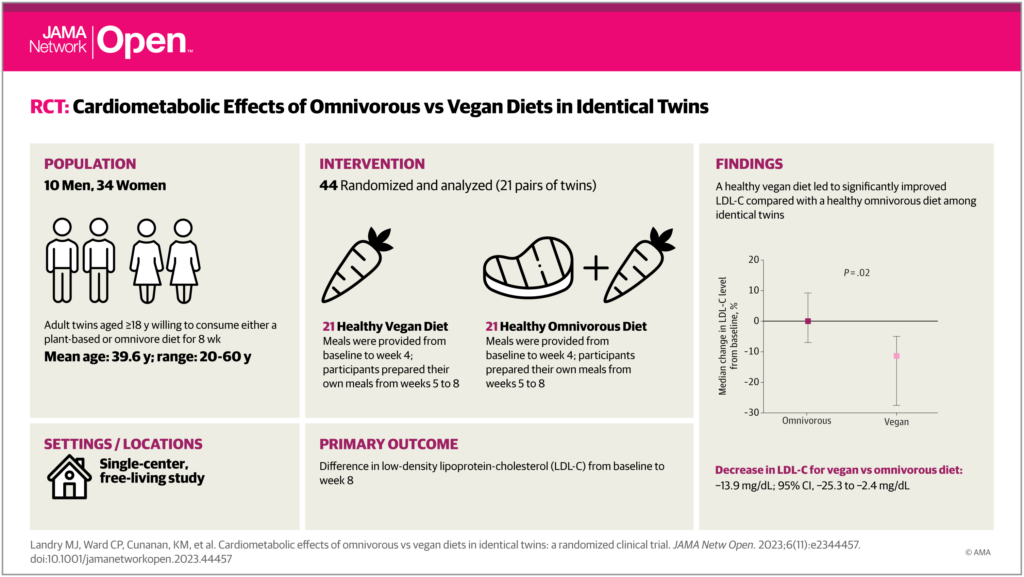Plant-Based Siblings: Vegan Diets Improve Heart Health, Shows A Study of Identical Twins
5 Mins Read
A unique study of identical twins – where one ate a vegan diet and the other a meat-based one for two months – has highlighted the cardiovascular benefits of the former, with lower ‘bad’ cholesterol levels, better blood glucose levels, and more weight loss.
All medical studies have their limitations, whether it’s the difference in participants’ genetics, upbringing or lifestyle choices. There is tons of research linking red meat consumption to increased risk of heart disease, and plant-based diets to a subsequent reduction. But these have similar limitations that are hard to control.
For example, in 2020, a study by the Stanford University School of Medicine revealed that replacing animal-derived protein with plant-based meat can reduce LDL (or ‘bad’) cholesterol and TMAO levels (a metabolite produced by gut bacteria linked with vascular and heart diseases). But it involved 36 participants from various backgrounds and lifestyles, which carried a degree of influence on the findings.
To limit these factors and control the genetic differences, the lead author from that study came up with the idea to analyse the effects of veganism and meat on identical twins, who grew up in the same households and reported similar lifestyles, including haircuts and clothing.
The new study, published in the JAMA Network Open journal last week, comprised 22 pairs of identical twins without any cardiovascular ailments from the Stanford Twin Registry – a database of both identical and fraternal twins who’ve agreed to participate in research studies – with one twin from each pair being put on either a vegan or meat-based diet. The findings reflect existing research about the impact of these foods on cardiovascular health, but with lesser influence from genetic and lifestyle factors.

A focus on healthy diets
The study describes both diets as healthy, rich with vegetables, legumes, fruits and whole grains, and devoid of sugars and refined starches. The omnivore diet consisted of chicken, fish, eggs, cheese, dairy and other animal-derived foods.
“I’m really into equipoise or balance in my studies — I don’t have a wonderfully healthy vegan diet and a crap strawman diet to be knocked over,” lead author Christopher Gardner told CNN. “People who ate the omnivorous diet ate more vegetables, more whole grains, less added sugar and less refined grains than they did in their usual habitual diet. Nor did they get crappy meat, it was all good quality. So, they actually had some dietary improvements.”
Over the first four weeks, the participants received 21 meal deliveries – breakfast, lunch and dinner – each week, while they cooked their own dishes for the rest of the four weeks. There was a registered dietitian on call to offer advice and answer questions, while the twins were interviewed about their consumption and maintained a log of the food they ate.
Of the 44 participants, 43 completed the study – only one person on a vegan diet didn’t. “This suggests that anyone who chooses a vegan diet can improve their long-term health in two months, with the most change seen in the first month,” said Gardner, a professor at the Stanford Prevention Research Center. This is the same principle that campaigns like Veganuary are based on.
But the study also came with its own limitations, as he explained to CNN: “To be honest, twins on the vegan diet had less satisfaction because it was so restrictive. So, there’s certainly the flip side of this: ‘Oh, I could have eaten more, but I just wasn’t hungry for more grains and more vegetables.'”
How vegan diets affected the twins’ health
The researched weighed the participants and drew their blood at three timepoints, and – as Gardner revealed – the most amount of change was seen in the first month, with people on a vegan diet exhibiting lower levels of LDL cholesterol, insulin and body weight – all factors associated with better cardiovascular health – than those eating meat.
The average baseline LDL cholesterol level was 110.7 mg/dL for vegans and 118.5 mg/dL for the meat-eaters at the beginning of the study. By the end, the former dropped to 95.5 and the latter to 116.1 (the optimal LDL cholesterol level is below 100). Since the participants already had levels close to the optimal range, Gardner said there was less room for improvement, and predicted that people with higher baseline LDL cholesterol would show greater change.
Additionally, the vegan participants showed a 20% drop in fasting insulin – higher insulin levels are a risk of developing diabetes – and lost an average of 4.2 lbs (1.9kg) than the omnivores. “Based on these results and thinking about longevity, most of us would benefit from going to a more plant-based diet,” Gardner said.

But he added that these improvements were to be expected, explaining to CNN: “The vegetarians got more fibre, less saturated fat. That’s going to explain the LDL cholesterol. More fibre is going to explain less fasting insulin because they just have a slower release of glucose in the bloodstream. And all the vegetables and fruits and grains are bulkier than meat and so people could be more satiated and eating fewer calories.”
Gardner noted that the vegan participants did the three most important things to better their heart health: cutting back on saturated fat, increasing the intake of dietary fibre, and losing weight.
He acknowledged that everyone won’t go vegan, but increased consumption of plant-based foods can go a long way for their health: “A vegan diet can confer additional benefits such as increased gut bacteria and the reduction of telomere loss, which slows ageing in the body.”
Gardner, who himself has been on a plant-forward diet for 40 years, advocated for reduction over elimination as a more pragmatic approach. “What’s more important than going strictly vegan is including more plant-based foods into your diet.”



